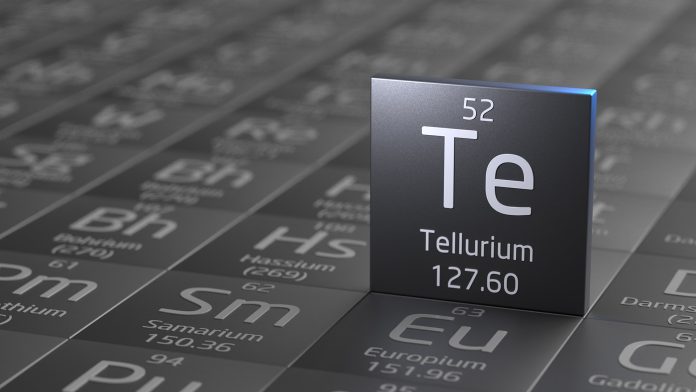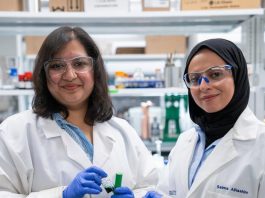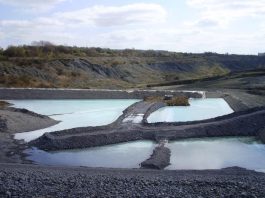From industry-changing technology to sourcing and exploration, First Tellurium is helping to spur a revolution for the critical metal tellurium.
For decades, tellurium sat quietly in the background of industry, serving as a speciality metal for alloys, rubber vulcanisation and ceramics. In the early 1990s, researchers began using tellurium to improve solar panels. Today, cadmium-telluride (CdTe)-based solar cells represent the world’s leading thin-film photovoltaic technology, led by Ohio-based First Solar Inc.
Beyond solar power, new applications for tellurium are ushering in revolutionary advances in sectors such as thermoelectric devices, lithium batteries, medicine and more. The metal has distinct and valuable properties, especially as a semiconductor. At least five countries, including the US, Canada, Australia, and Japan, have designated tellurium as a critical and strategic metal, and they are looking to source more of it domestically.
First Tellurium Corp in Canada and the United States
First Tellurium is the only resource company in North America focused on exploring for tellurium. The company’s two key mineral projects – Deer Horn in British Columbia and Klondike in Colorado – represent two of the highest-grade tellurium properties in the Western world.
Klondike was previously owned by First Solar as a potential source of tellurium for its solar panels. When shareholders urged the company to abandon mining and focus on manufacturing, two of First Solar’s geologists took over the property and then vended it to First Tellurium.
Generating clean power from waste heat and temperature differentials
In 2023, First Tellurium was approached by US tech inventor Michael Abdelmaseh, who had finished prototypes of an advanced, tellurium-based thermoelectric generator. The device fit neatly within First Tellurium’s strategy of fostering ‘vertical, innovation-driven growth,’ and a deal was struck to form a thermoelectric technology-focused research, development and commercialisation venture called PyroDelta Energy, with First Tellurium being the majority owner.
First Tellurium President and CEO Tyrone Docherty said: “Thermoelectric applications, whereby heat and cold are converted to electricity, represent the number two use of tellurium worldwide. Tellurium’s unique properties make it an ideal material for this process.”
Expert Market Research valued the thermoelectric module market at over US$811m in 2023,¹ while Fortune Business Insights projects the market will grow to US$1.2bn by 2030, exhibiting a CAGR of 12.0 % during the forecast period.²
PyroDelta’s thermoelectric generator, however, offers significant advantages over existing thermoelectric technologies. It withstands far greater temperature extremes, making it ideal for industrial applications. It’s also lighter, more durable and easier to manufacture.
These advantages offer important efficiencies for the automotive industry, where the generator can harness waste heat from internal combustion engines and electric vehicles and then convert that heat to electrical energy. The recovered power can be used to significantly increase fuel efficiency.
Abdelmaseh said: “We believe the device can make alternators obsolete. The transition to electric vehicles will take decades, and this generator could save significant amounts of fuel in the meantime.”
Within the solar energy sector, the generator can leverage temperature differentials to deliver consistent power day and night as well as on cloudy days. Abdelmaseh said: “We believe this could be a game changer for solar power.”
For the agricultural sector, greenhouses can utilise temperature contrasts to generate power and save significantly on energy bills.
The generator’s light weight and compact size also makes it ideal for extending the range of drones for both industry and defence. The drone generator, now under development, exploits temperature differentials associated with propellor downwash. The system contains no moving parts, ensuring silent operation and reducing detection risks.
Interest from the Department of Defense
The U.S. Department of Defense recently directed First Tellurium to join the Defense Industrial Base Consortium (DIBC) to move ahead with further discussions around tellurium sourcing and applications. The DIBC helps the Department of Defense access commercial solutions for defence requirements and innovations from industry, academia, and non-traditional contractors.
Agreement with RESOLVE for up to $29m in development capital
In May of this year, First Tellurium reported it had reached a Memorandum of Understanding (MOU) with Washington, DC-based RESOLVE, Inc., a global non-governmental organisation, to secure up to $29m (approximately CAD$39.5m) in funding for manufacturing and marketing and the acquisition of high-purity tellurium, antimony, and other critical metals for the PyroDelta device.
RESOLVE and PyroDelta formed a partnership called Tellurium Electric to bring the thermoelectric device to market. Under the MOU, RESOLVE will provide governance, administrative, and fundraising support through RESOLVE Enterprises, the organisation’s incubator for start-up social enterprises, as well as Regeneration Inc., which re-mines and restores old mine tailings to extract minerals critical for the energy transition and the circular economy. Regeneration is backed by Rio Tinto, Apple, Caterpillar and other partners. A number of Regeneration’s first projects are expected to produce tellurium from copper tailings or as a byproduct, which would be used for manufacturing the PyroDelta device.
Sourcing tellurium domestically
Adhering to mandates from both the Trudeau and Biden administrations for sourcing critical metals domestically in Canada and the US, tellurium for manufacturing the generator will be sourced from North American suppliers.
Docherty said: “This will ensure resilience in design while guarding against supply chain disruptions. Our longer-term intent is to become a key supplier of tellurium for the device from our holdings in British Columbia and Colorado.”
Funding proposal with the National Science Foundation
In July of this year, Mr Abdelmaseh was invited to submit a full Phase I funding proposal to the U.S. National Science Foundation’s (NSF) Small Business Innovation Research (SBIR)/Small Business Technology Transfer (STTR) programme to help bring the device to market. This invitation follows the successful evaluation of an initial project proposal in the NSF’s STTR Energy Technologies (EN) category.
Abdelmaseh said: “The National Science Foundation is a very prestigious and selective institution. This opportunity represents the first and vital step in the process of obtaining grant-based funding from them.”
Tellurium has clearly assumed new importance in the clean energy transition. Moving forward, domestic suppliers of the metal, along with innovators in its applications, will assume critical new roles in North America’s security and industry.
References
- Source: https://www.expertmarketresearch.com/reports/thermoelectric-modules-market
- Source: https://www.fortunebusinessinsights.com/industry-reports/thermoelectric-module-market-100590
Please note, this article will also appear in the 19th edition of our quarterly publication.









